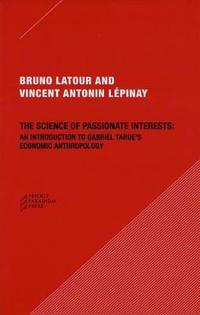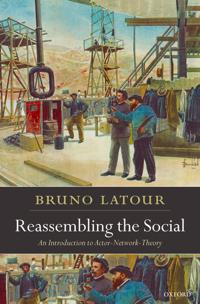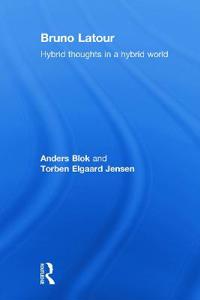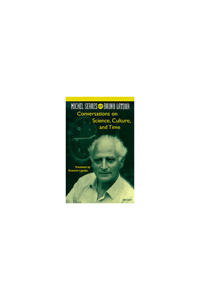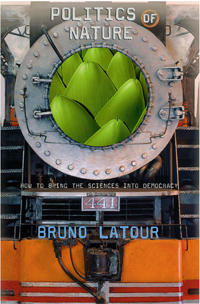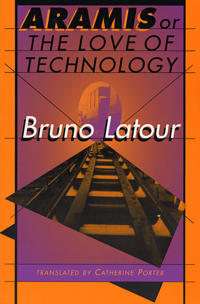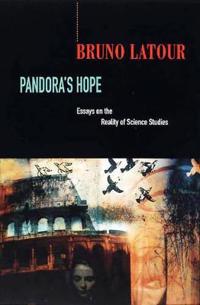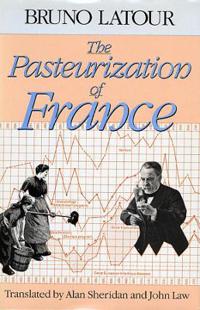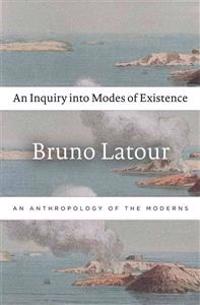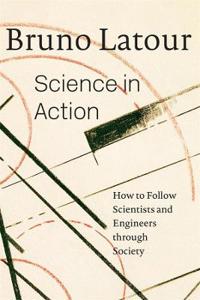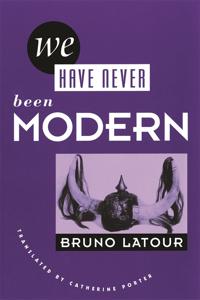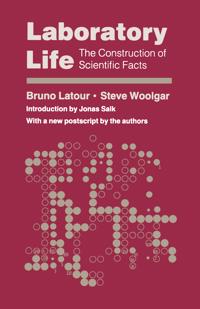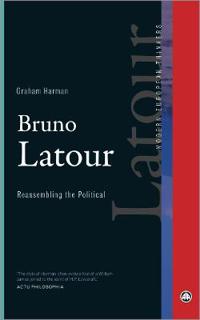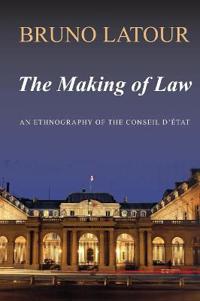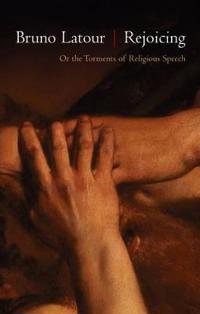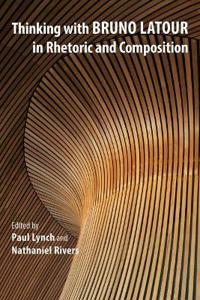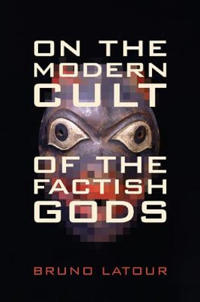The Science of Passionate Interests (Pocket)
avBruno Latour, Vincent Antonin Lepinay, Bruno Latour
ISBN: 9780979405778 - UTGIVEN: 200911How can economics become genuinely quantitative? This is the question that French sociologist Gabriel Tarde tackled at the end of his career, and in this pamphlet, Bruno Latour and Vincent Antonin Lepinay offer a lively introduction to the work of that forgotten genius of nineteenth-century social t[...]
Reassembling the Social (Häftad)
avBruno Latour
ISBN: 9780199256051 - UTGIVEN: 200709Reassembling the Social is a fundamental challenge from one of the world's leading social theorists to how we understand society and the 'social'. Bruno Latour's contention is that the word 'social', as used by Social Scientists, has become laden with assumptions to the point where it has become mis[...]
Bruno Latour (Inbunden)
avAnders Blok, Torben Elgaard Jensen
ISBN: 9780415602785 - UTGIVEN: 2011-05-27Bruno Latour (Häftad)
avAnders Blok, Torben Elgaard Jensen
ISBN: 9780415642989 - UTGIVEN: 201209French sociologist and philosopher, Bruno Latour, is one of the most significant and creative thinkers of the last decades. Bruno Latour: Hybrid Thoughts in a Hybrid World is the first comprehensive and accessible English-language introduction to this multi-faceted work. The book focuses on core Lat[...]
Conversations on Science, Culture, and Time (Häftad)
avMichel Serres, Bruno Latour
ISBN: 9780472065486 - UTGIVEN: 199503Although elected to the prestigious French Academy in 1990, Michel Serres has long been considered a maverick--a provocative thinker whose prolific writings on culture, science and philosophy have often baffled more than they have enlightened. In these five lively interviews with sociologist Bruno L[...]
Politics of Nature (Häftad)
avBruno Latour
ISBN: 9780674013476 - UTGIVEN: 200405A major work by one of the more innovative thinkers of our time, Politics of Nature does nothing less than establish the conceptual context for political ecology - transplanting the terms of ecology into more fertile philosophical soil than its proponents have thus far envisioned. Bruno Latour annou[...]
Aramis, or the Love of Technology (Häftad)
avBruno Latour
ISBN: 9780674043237 - UTGIVEN: 199605Frankenstein's monster was born of human endeavour and 19th-century ignominious end but provided many lessons during his 24 years of plans and prototypes. Aramis, the guided-transportation system intended for Paris, represented a major advance in "personal rapid transit" - a system that combined the[...]
Pandora's Hope (Häftad)
avBruno Latour
ISBN: 9780674653368 - UTGIVEN: 199905A scientist friend asked Bruno Latour point-blank: "Do you believe in reality?" Taken aback by this strange query, Latour offers his meticulous response in "Pandora's Hope." It is a remarkable argument for understanding the reality of science in practical terms. In this book Latour, identified by R[...]
The Pasteurization of France (Häftad)
avBruno Latour
ISBN: 9780674657618 - UTGIVEN: 199310Although every town in France has a street named for Pasteur, was he alone able to stop people from spitting, persuade them to dig drains, influence them to undergo vaccination? Pasteur's success depended upon a whole network of forces, including the public hygiene movement, the medical profession ([...]
An Inquiry into Modes of Existence (Inbunden)
avBruno Latour
ISBN: 9780674724990 - UTGIVEN: 201308In this new book, Bruno Latour offers answers to questions raised in "We Have Never Been Modern, "a work that interrogated the connections between nature and culture. If not modern, he asked, what "have" we been, and what values should we inherit? Over the past twenty-five years, Latour has develope[...]
Science in Action (Häftad)
avBruno Latour
ISBN: 9780674792913 - UTGIVEN: 198807Science and technology have immense authority and influence in our society, yet their working remains little understood. The conventional perception of science in Western societies has been modified in recent years by the work of philosophers, sociologists and historians of science. In this book Bru[...]
We Have Never Been Modern (Häftad)
avBruno Latour
ISBN: 9780674948396 - UTGIVEN: 199310With the rise of science, we moderns believe, the world changed irrevocably, separating us forever from our primitive, premodern ancestors. But if we were to let go of this fond conviction, Bruno Latour asks, what would the world look like? His book, an anthropology of science, shows us how much of [...]
Laboratory Life (Häftad)
avBruno Latour, Steve Woolgar
ISBN: 9780691028323 - UTGIVEN: 198609This highly original work presents laboratory science in a deliberately skeptical way: as an anthropological approach to the culture of the scientist. Drawing on recent work in literary criticism, the authors study how the social world of the laboratory produces papers and other "texts," and how the[...]
Bruno Latour (Häftad)
avGraham Harman
ISBN: 9780745333991 - UTGIVEN: 2014-10Bruno Latour, the French sociologist, anthropologist and long-established superstar in the social sciences is revisited in this pioneering account of his ever-evolving political philosophy. Breaking from the traditional focus on his metaphysics, most recently seen in Harman's book Prince of Networks[...]
Bruno Latour (Inbunden)
avGraham Harman
ISBN: 9780745334004 - UTGIVEN: 2014-10Bruno Latour, the French sociologist, anthropologist and long-established superstar in the social sciences is revisited in this pioneering account of his ever-evolving political philosophy. Breaking from the traditional focus on his metaphysics, most recently seen in Harman's book Prince of Networks[...]
The Making of Law: An Ethnography of the Conseil d'Etat (Inbunden)
avBruno Latour
ISBN: 9780745639840 - UTGIVEN: 2009-12-31The Making of Law: An Ethnography of the Conseil D'Etat (Häftad)
avBruno Latour
ISBN: 9780745639857 - UTGIVEN: 201001In this book, Bruno Latour pursues his ethnographic inquiries into the different value systems of modern societies. After science, technology, religion, art, it is now law that is being studied by using the same comparative ethnographic methods. The case study is the daily practice of one of the Fre[...]
Bruno LaTour
ISBN: 9780745650623 - UTGIVEN: 2016-10Bruno Latour is among the most important figures in contemporary philosophy and social science. His ethnographic studies have revolutionized our understanding of areas as diverse as science, law, politics and religion. To facilitate a more realistic understanding of the world, Latour has introduced [...]
Bruno LaTour (häftad)
ISBN: 9780745650630 - UTGIVEN: 2016-10Bruno Latour is among the most important figures in contemporary philosophy and social science. His ethnographic studies have revolutionized our understanding of areas as diverse as science, law, politics and religion. To facilitate a more realistic understanding of the world, Latour has introduced [...]
Rejoicing: Or the Torments of Religious Speech (Häftad)
avBruno Latour
ISBN: 9780745660066 - UTGIVEN: 2013-06-30Bruno Latour's long term project is to compare the felicity and infelicity conditions of the different values dearest to the heart of those who have 'never been modern'. According to him, this is the only way to develop an anthropology of the Moderns.[...]
Rejoicing: Or the Torments of Religious Speech (Häftad)
avBruno Latour
ISBN: 9780745660073 - UTGIVEN: 201307Bruno Latour's long term project is to compare the felicity and infelicity conditions of the different values dearest to the heart of those who have 'never been modern'. According to him, this is the only way to develop an anthropology of the Moderns. After his work on science, on technology and, mo[...]
Thinking with Bruno LaTour in Rhetoric and Composition (häftad)
ISBN: 9780809333936 - UTGIVEN: 2015-04Best known for his books "We Have Never Been Modern," "Laboratory Life," and "Science in Action," Bruno Latour has inspired scholarship across many disciplines. In the past few years, the fields of rhetoric and composition have witnessed an explosion of interest in Latour s work. Editors Paul Lynch [...]
On the Modern Cult of the Factish Gods (Häftad)
avBruno Latour
ISBN: 9780822348252 - UTGIVEN: 201012On the Modern Cult of the Factish Gods continues the project that the anthropologist, philosopher, and influential science studies theorist Bruno Latour advanced in his book We Have Never Been Modern. There he proposed to re-describe the Enlightenment idea of universal scientific truth, arguing that[...]
Bruno Latour in Pieces (Pocket)
avHenning Schmidgen, Gloria (TRN) Custance, Henning Schmidgen
ISBN: 9780823263707 - UTGIVEN: 2014-10Bruno Latour stirs things up. Latour began as a "lover" of science and technology, as co-founder of Actor-Network theory (ANT), and as philosopher of a Modernity that had "never been modern". In the meantime he is regarded not just as one of the most intelligent and also popular exponents of science[...]
Bruno Latour
ISBN: 9781138924574 - UTGIVEN: 2015-06The first extended study of Bruno Latour's legal theory, this book presents a critical reconstruction of the whole of Latour's oeuvre to date, from Laboratory Life to An Inquiry into the Modes of Existence. Based on the powerful insights into normative effects that actor-network theory makes possibl[...]

